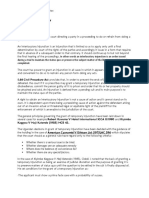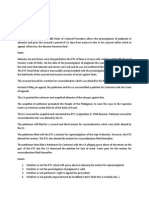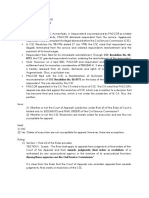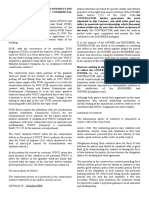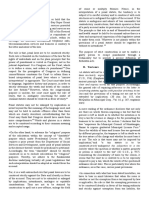Q
Q
Uploaded by
Mc Vharn CatreCopyright:
Available Formats
Q
Q
Uploaded by
Mc Vharn CatreOriginal Description:
Copyright
Available Formats
Share this document
Did you find this document useful?
Is this content inappropriate?
Copyright:
Available Formats
Q
Q
Uploaded by
Mc Vharn CatreCopyright:
Available Formats
Q: May the court refuse to execute a judgment on the ground that the judgement was wrong or erroneous?
A: NO, because it is a matter of and the issuance of the corresponding writ of execution upon a final and
executory judgment is a ministerial duty of the court to execute which is compellable by mandamus. (Ebero vs.
Cañizares, 79 Phil. 152)
Only the court of origin issues the writ of execution, although one can apply with the appellate court if its
decision has become final, but it will still be the court of origin which will be directed to issue the writ.
Q: Can one court by injunction or restraining order stop the execution of a judgment of another court?
A: GENERAL RULE: NO, because that will amount to interference. EXCEPTIONS: (when the enforcement of a
final judgment may be stopped by way of injunction)
1.) Upon the filing of a petition for relief from judgment, the court may grant preliminary injunction to
preserve the rights of the parties, Rule 38, Section 5.
2.) Action for annulment of judgment of the RTC filed in the CA.
The grounds to quash a writ of execution:
1. When subsequent facts and circumstances which render such execution impossible or unjust, such as
supervening cause.
2. In cases of special and exceptional nature and higher interest of justice.
3. On equitable grounds such as when there has been change in the situation of the parties which make
execution impossible.
4. Judgment has been novated by the parties.
5. Judgment turned out to be incomplete.
Q: Discuss briefly the nature of the action for enforcement of a dormant judgment.
A: The action for enforcement of a dormant judgment is an ordinary civil action the object of which is two-
fold, namely,
a) to revive the dormant judgment, and
b) to execute the judgment reviving it, if it grants the plaintiff any relief.
Hence, the rights of the judgment-creditor depend upon the second judgment. Being an ordinary civil action, it
is subject to all defenses, objections and counterclaims which the judgment-debtor may have except that no
inquiry can be made as to the merits of the first judgment. Therefore, defenses that do not go to the merits of
the first judgment, such as lack of jurisdiction, collusion, fraud, or prescription, may be set up by the
judgment-debtor. (Cia. Gral. De Tabacos vs. Martinez, 17 Phil. 160; Salvante vs. Ubi Cruz, 88 Phil. 236) [Taken
from Remedial Law Reviewer by Nuevas]
Q: Give the exception to the rule on dormant judgment.
A: The only exception is the judgment for support which does not become dormant, nor does it prescribe. You
can execute it anytime even beyond the 5-year period and any unpaid installment may be executed by
motion. (Florendo vs. Organo, 90 Phil. 483)
You might also like
- The Book of Writs - With Sample Writs of Quo Warranto, Habeas Corpus, Mandamus, Certiorari, and ProhibitionFrom EverandThe Book of Writs - With Sample Writs of Quo Warranto, Habeas Corpus, Mandamus, Certiorari, and ProhibitionRating: 5 out of 5 stars5/5 (10)
- Rule 39 Execution, Satisfaction and Effect of Judgement (Rule 39)Document51 pagesRule 39 Execution, Satisfaction and Effect of Judgement (Rule 39)xeileen08No ratings yet
- 5 Jose Vs JavellanaDocument4 pages5 Jose Vs JavellanaRENGIE GALO100% (2)
- ProvRem - Preliminary Injunction - Case Digest - SY 2018 To 2019Document7 pagesProvRem - Preliminary Injunction - Case Digest - SY 2018 To 2019Lala PastelleNo ratings yet
- Remedies On Final and Executory JudgmentDocument4 pagesRemedies On Final and Executory JudgmentJayson Malero100% (1)
- Zimbabwean Law - Recent Cases 20152Document33 pagesZimbabwean Law - Recent Cases 20152Dickson Tk Chuma Jr.No ratings yet
- Walter Wells LTD V Wilson Samuel Jackson 1984Document6 pagesWalter Wells LTD V Wilson Samuel Jackson 1984talk2marvin70No ratings yet
- Module 6 Reviewer Rule 39 To Provisional RemediesDocument10 pagesModule 6 Reviewer Rule 39 To Provisional RemediesDhang Cerilo AparenteNo ratings yet
- Civil ProcedureDocument17 pagesCivil ProcedureNKOYOYO HANNINGTONNo ratings yet
- Execution of JudgmentDocument4 pagesExecution of JudgmentBernard Lolo100% (1)
- AnswersDocument5 pagesAnswersHemanth RaoNo ratings yet
- Temporary InjunctionDocument4 pagesTemporary InjunctionRinna AshabaNo ratings yet
- De La Cruz vs. Hon. Tan Torres and TiongcoDocument5 pagesDe La Cruz vs. Hon. Tan Torres and TiongcoNxxxNo ratings yet
- RuleDocument61 pagesRuleKcompacionNo ratings yet
- © Sostine Ngabirano 2014: InjunctionsDocument4 pages© Sostine Ngabirano 2014: InjunctionsWahanze RemmyNo ratings yet
- Civil Procedure Code 1908 NotesDocument23 pagesCivil Procedure Code 1908 NotesAbhilash Aggarwal100% (2)
- Rule 39 - ExecutionDocument66 pagesRule 39 - ExecutionCecil BernabeNo ratings yet
- Formerly Remedial Law, Legal Ethics, and Practical ExercisesDocument14 pagesFormerly Remedial Law, Legal Ethics, and Practical ExercisesSuprema LexNo ratings yet
- 2nd Batch - Sps. Yap v. Intl BankDocument2 pages2nd Batch - Sps. Yap v. Intl Bankjanine nenariaNo ratings yet
- Civ Pro 4th Exam Cases (Rule 39)Document73 pagesCiv Pro 4th Exam Cases (Rule 39)Carra Trisha C. TitoNo ratings yet
- Rule 58 For ReportDocument11 pagesRule 58 For ReportLegarde Maricel100% (1)
- PERJUICIO Judgment. That Is Not A Valid Judgment. The Requirement Applies To All Courts Whether MTC, RTC, or CADocument13 pagesPERJUICIO Judgment. That Is Not A Valid Judgment. The Requirement Applies To All Courts Whether MTC, RTC, or CAKcompacionNo ratings yet
- 400 QUESTIONSDocument5 pages400 QUESTIONSGipson DagwayNo ratings yet
- Leo EchegarayDocument2 pagesLeo EchegarayAnna Dela VegaNo ratings yet
- Heirs of Sps Reterta Vs Sps MoresDocument4 pagesHeirs of Sps Reterta Vs Sps MoresJoshua Quentin TarceloNo ratings yet
- Almuete Vs People Complete With Doctrine and FootnotesDocument3 pagesAlmuete Vs People Complete With Doctrine and FootnotesKrizia FabicoNo ratings yet
- Frequently - Asked - Question in Judiciary InterviewDocument21 pagesFrequently - Asked - Question in Judiciary Interviewammukutti1012No ratings yet
- Temporary Injunction Under CPCDocument5 pagesTemporary Injunction Under CPCSANTHOSH KUMAR T MNo ratings yet
- EARLY JUDGEMENTSDocument6 pagesEARLY JUDGEMENTSstellamarismutindi433No ratings yet
- AssignmentDocument18 pagesAssignmentAyesha KantaNo ratings yet
- Republic vs. SandiganbayanDocument52 pagesRepublic vs. SandiganbayanElephantNo ratings yet
- Consolidated - Post Judgment RemediesDocument76 pagesConsolidated - Post Judgment RemediesA.K. FernandezNo ratings yet
- Republic vs. SandiganbayanDocument104 pagesRepublic vs. SandiganbayanQuennie Jane SaplagioNo ratings yet
- Spouses Lago V Judge AbdulDocument4 pagesSpouses Lago V Judge AbdulElah ViktoriaNo ratings yet
- 02 Pagcor Vs AugmentadoDocument2 pages02 Pagcor Vs AugmentadoPiaNo ratings yet
- CPC Brief NotessDocument46 pagesCPC Brief NotessPriyam JainNo ratings yet
- Provisional Remedies: Rule 57 Preliminary AttachmentDocument38 pagesProvisional Remedies: Rule 57 Preliminary AttachmentAi LeenNo ratings yet
- Stay of ExecutionDocument3 pagesStay of Executionnandala brianNo ratings yet
- Civil Procedure Case DigestsDocument37 pagesCivil Procedure Case Digestsjharik23No ratings yet
- Code of Civil Procedure 1908 Csfuturz NotesDocument21 pagesCode of Civil Procedure 1908 Csfuturz NotescontactwitharunNo ratings yet
- 2024 Bar Syllabus - Remedial Law, Legal and Judicial Ethics With Practical Exercises164Document109 pages2024 Bar Syllabus - Remedial Law, Legal and Judicial Ethics With Practical Exercises164Mida SalisaNo ratings yet
- 11 Sarsaba v. Vda Dela TorreDocument25 pages11 Sarsaba v. Vda Dela TorreMlaNo ratings yet
- Pleaded. Defenses and Objections Not PleadedDocument7 pagesPleaded. Defenses and Objections Not PleadedImmanuel DyNo ratings yet
- 2004 Remedial Law Bar Questions (CIVPRO)Document5 pages2004 Remedial Law Bar Questions (CIVPRO)Chezanie Chelle PunongbayanNo ratings yet
- Code of Civil Procedure and Limitation ActDocument77 pagesCode of Civil Procedure and Limitation ActAmaira KhanNo ratings yet
- Grounds For Return of PlaintDocument11 pagesGrounds For Return of PlaintFarhan Jan50% (2)
- Rule 58 Bar Qs With AsDocument11 pagesRule 58 Bar Qs With As2301109388No ratings yet
- Character of Illness Is Serious ("Such As To Render Non-AttendanceDocument10 pagesCharacter of Illness Is Serious ("Such As To Render Non-AttendanceIris Roncesvalles QuimbaNo ratings yet
- INTrerDocument6 pagesINTrerPallab SinghaNo ratings yet
- Notes CPCDocument22 pagesNotes CPCMrityKumar100% (4)
- Almuete v. PeopleDocument2 pagesAlmuete v. PeopleCharmila SiplonNo ratings yet
- Rule 57 Sec 2-3 CasesDocument72 pagesRule 57 Sec 2-3 CasesMarry SuanNo ratings yet
- De Leon V Court of AppealsDocument11 pagesDe Leon V Court of AppealsMio OliverNo ratings yet
- Masukeme V Acting Principal of United College of Education (Mbona) and Anor (HC 2971 of 2002) 2003 ZWBHC 46 (26 March 2003)Document5 pagesMasukeme V Acting Principal of United College of Education (Mbona) and Anor (HC 2971 of 2002) 2003 ZWBHC 46 (26 March 2003)Franco DurantNo ratings yet
- Civpro Transcript Finals Period 9Document11 pagesCivpro Transcript Finals Period 9Ren ConchaNo ratings yet
- 8 - Douglas Lu Ym Vs NabuaDocument1 page8 - Douglas Lu Ym Vs NabuaLouana AbadaNo ratings yet
- CPC Notes and Case Laws - FewDocument11 pagesCPC Notes and Case Laws - FewyashirupNo ratings yet
- CPC Brief NotesDocument46 pagesCPC Brief NotesNaksh SansonNo ratings yet
- Legal Memorandum On Motion For Execution - RevisedDocument15 pagesLegal Memorandum On Motion For Execution - RevisedfelinemevangelistaNo ratings yet
- California Supreme Court Petition: S173448 – Denied Without OpinionFrom EverandCalifornia Supreme Court Petition: S173448 – Denied Without OpinionRating: 4 out of 5 stars4/5 (1)
- Nat Res All CasesDocument36 pagesNat Res All CasesMc Vharn CatreNo ratings yet
- I. Revised Penal Code (RPC) and Related Special Laws: Riminal AWDocument11 pagesI. Revised Penal Code (RPC) and Related Special Laws: Riminal AWMc Vharn CatreNo ratings yet
- Be It Enacted by The Senate and House of Representatives of The Philippines in CongressDocument28 pagesBe It Enacted by The Senate and House of Representatives of The Philippines in CongressMc Vharn CatreNo ratings yet
- Rape CasesDocument24 pagesRape CasesMc Vharn CatreNo ratings yet
- 3rd Exam Cases OBLADIDocument147 pages3rd Exam Cases OBLADIMc Vharn CatreNo ratings yet
- Catre, MC Vharn A. Penal LawsDocument10 pagesCatre, MC Vharn A. Penal LawsMc Vharn CatreNo ratings yet
- Judicial Affidavit - Sum of MoneyDocument10 pagesJudicial Affidavit - Sum of MoneyJose MasarateNo ratings yet
- Land Bank V KhoDocument3 pagesLand Bank V KhoDaryst Huertas100% (1)
- Mindanao Bus Co. v. City Assessor and Treasurer 1962Document6 pagesMindanao Bus Co. v. City Assessor and Treasurer 1962Maricel Caranto FriasNo ratings yet
- ATP 100 Civil Litigation - Nov 2012Document4 pagesATP 100 Civil Litigation - Nov 2012Wylson LogisticalsNo ratings yet
- Penalty Clauses and Claims For DamagesDocument3 pagesPenalty Clauses and Claims For DamagesPaul MaposaNo ratings yet
- People v. OchoaDocument3 pagesPeople v. OchoaPhattsBee100% (1)
- Reflections On The Guillotine PDFDocument50 pagesReflections On The Guillotine PDFcoolavi0127100% (3)
- Criminal Appeal No. 118 of 2013 Kamlakar v. State of MaharashtraDocument7 pagesCriminal Appeal No. 118 of 2013 Kamlakar v. State of MaharashtraKratika IndurkhyaNo ratings yet
- Review PetitionDocument6 pagesReview PetitionSana ParveenNo ratings yet
- Blueprint Studios Trends v. Luxe Events Rentals - ComplaintDocument92 pagesBlueprint Studios Trends v. Luxe Events Rentals - ComplaintSarah BursteinNo ratings yet
- Nationals 2011 LD Negative CaseDocument5 pagesNationals 2011 LD Negative CasewonhorNo ratings yet
- ST Lukes Vs NLRC GR No. 162053Document9 pagesST Lukes Vs NLRC GR No. 162053JNo ratings yet
- Deed of DonationDocument2 pagesDeed of DonationJonathan LunarNo ratings yet
- 20 Crayons Processing v. Felipe Pula (TAN)Document2 pages20 Crayons Processing v. Felipe Pula (TAN)Clyde TanNo ratings yet
- Cruz vs. Cruz (G.R. No. 173292 Dated 1 September 2010)Document5 pagesCruz vs. Cruz (G.R. No. 173292 Dated 1 September 2010)Gia DimayugaNo ratings yet
- People v. Bago G.R. No. 122290, 6 April 2000 FactsDocument2 pagesPeople v. Bago G.R. No. 122290, 6 April 2000 FactsHemsley Battikin Gup-ayNo ratings yet
- The Law On Alternative Dispute Resolution: Private Justice in The PhilippinesDocument13 pagesThe Law On Alternative Dispute Resolution: Private Justice in The PhilippinesLeoj AnuleNo ratings yet
- Property Law Project 1Document24 pagesProperty Law Project 1Anagh0% (1)
- First Circuit Brief About Final Rule Next StepsDocument109 pagesFirst Circuit Brief About Final Rule Next StepsLindsey KaleyNo ratings yet
- People v. SalahuddinDocument3 pagesPeople v. SalahuddinJimbo ManiriNo ratings yet
- INZ 1225 - Work Visa Declaration FormDocument2 pagesINZ 1225 - Work Visa Declaration FormRafael Cunan JrNo ratings yet
- ELS SABQ'sDocument139 pagesELS SABQ'sbaabaenchNo ratings yet
- Mata vs. BayonaDocument3 pagesMata vs. BayonaEarl NuydaNo ratings yet
- ORDER 17 Adjournments (R.1 and R.2)Document2 pagesORDER 17 Adjournments (R.1 and R.2)Tejinder Goyal100% (1)
- LTD Assignment 1Document213 pagesLTD Assignment 1Jessica Joyce PenalosaNo ratings yet
- Provisional Remedies Cases - Rule 57 PDFDocument501 pagesProvisional Remedies Cases - Rule 57 PDFBianca CezarNo ratings yet
- Anti Theft PolicyDocument14 pagesAnti Theft PolicypraymiikNo ratings yet
- Learning Child Vs Ayala Case DigestDocument2 pagesLearning Child Vs Ayala Case DigestKrystelleNo ratings yet
- White House Election Fraud Report by StatesDocument381 pagesWhite House Election Fraud Report by StatesAnonymous oUYx023Ng4100% (1)
- 2019 Market Risk Alternative Specific Privacy Statement enDocument5 pages2019 Market Risk Alternative Specific Privacy Statement enKamel TruxNo ratings yet














